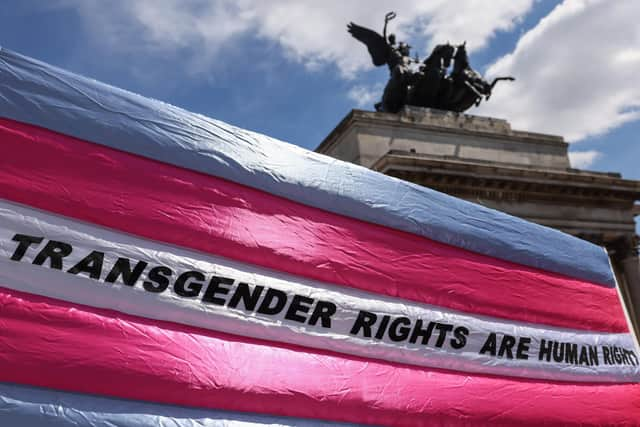Transgender Scots forced to crowdfund surgery due to NHS waiting backlog
Pleas for help can be found on sites such as GoFundMe and JustGiving from both trans men and trans women, driven to desperation by waiting times measured in years, not months.
Young trans people in Scotland are also being forced to take out large loans or deplete their life savings to purchase private treatment, due to “completely unsustainable” waiting times for gender-affirming surgery and hormones.
Advertisement
Hide AdAdvertisement
Hide Ad“It’s infuriating … it's gutting because it is a failure of the system,” says David, a 28-year-old trans man who claims he was let down by the NHS.


“We are not supposed to be doing the thing they do in America where you have a medical need and you have to go on the internet and ask other people to ‘please help me’ with my urgent medical care.
“It sucks. And it's so frustrating because the crowdfunding system is just inherently unfair.
“If you are young, conventionally attractive, white and you have a large social media presence, you will relatively likely get funded. If you are not those things, chances are you will just be sitting with your GoFundMe with like 200 quid in it for like five years.
“In fact, most people don't succeed in crowdfunding.”
David, who is now 28 and wanted his real name to be anonymous, was living as non-binary since he was a teenager, but during the pandemic realised he was trans. When he was referred to a NHS Gender Identity Clinic, he was told there was a 36-month waiting list.
However, he was also told it was taking the clinic three months to work through one month’s worth of referrals, meaning he could have been left living with gender dysmorphia for as long as nine years.
Eventually David managed to secure treatment in Spain – at substantial cost – through a combination of fundraising and taking out loans.
“I went to Spain, where my surgery costs were €5,900 [£5,152], but obviously on top of that, there’s travel and accommodation for two weeks in Spain – so more like €8,000 [£6,985],” he says.
Advertisement
Hide AdAdvertisement
Hide Ad“If you want surgery in the UK, it would cost between £6,000-£10,000.
“It’s a big chunk of money. Obviously you’ve got a lot of younger people who can’t take out loans crowdfunding, and you’ve got older people with jobs taking out loans, which has a financial impact.
“Even for people who are managing to do it through savings, they’re spending a large chunk of their 20s saving up thousands of pounds, which could have gone on a house deposit.”
A spokesperson for transgender charity Gendered Intelligence, Cleo Madeleine, said: “The wait times for NHS treatment have become completely unsustainable, and it's pushing more and more people towards private surgeries.
“This is essential, life-changing, sometimes even life-saving, surgery that should be available on the NHS.
“There's really no other area of healthcare in the UK that is seeing delays as substantial as gender identity services are right now.
“It's really astonishing that health care for this one particular marginalised group is so much worse off than pretty much any other area.”
The healthcare environment around gender also plays a part, argues David, due to the “intrusive” system of changing gender.
Advertisement
Hide AdAdvertisement
Hide Ad“In many other countries, you can access care through an informed consent system by your GP,” he says. “Your GP will give you a leaflet, a booklet, maybe send you some videos explaining about hormones, what this will do, what the permanent effects are, what the possible side effects are and then you can make a decision to proceed.
“Here, they want you to have an assessment, which doesn’t really do anything useful, and tends to be very intrusive. They have no evidence for the assessments they’re doing, and they’re asking you questions like ‘how do you have sex?’ Or ‘what do you think about when you masturbate?’.
“They’ve got no diagnostic evidence for filtering people out who are likely to de-transition.”
The heated, polarised debate on social media is affecting healthcare in Scotland, says Madeleine. “What we honestly really want to see is just an end to the culture war nonsense that has erupted in the papers and on social media,” she says.
“All it does is fire up a prejudice against trans people, which in turn, it worsens the environment. It worsens the conversation around health care. It stigmatises trans people who are trying to seek health care, and it leads to misinformation among healthcare professionals.”
A Scottish Government spokesperson said: “It is important that trans people, and anyone exploring their gender identity, are able to access the right support at the right time when they need it. We recognise the need to improve access to, and delivery of, NHS gender identity services.
“In December 2021, the Scottish Government published a framework for NHS gender identity service improvement. As set out in that framework, we have committed to a number of actions which are inclusive of working to improve current provision, reduce waiting times and better support those waiting to access clinical services. This work is ongoing.”
Comments
Want to join the conversation? Please or to comment on this article.